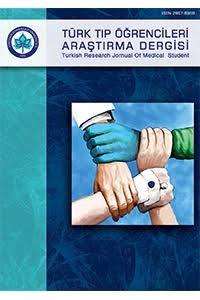Pandemi Sürecinin Kas İskelet Sistemi Üzerine Etkisi
Bu araştırma; 18 yaş ve üstü bireylerde, Covid-19 pandemi sürecinde yaygınlaşan masa başı çalışma durumunun kas-iskelet sistemi üzerine etkisini saptamak amacı ile gerçekleştirilmiştir. Araştırma 23-31 Mart 2021 tarihleri arasında çevrimiçi platform üzerinden hazırlanan veri toplama formu yolu ve 1050 kişinin katılımı ile gerçekleşmiştir. Cinsiyet bakımından kadın birey oranı %65.5 olan katılımcıların %53.7’si 18-24 yaş aralığında yer almaktadır. Kadın bireylerin %27.6’sı, erkek bireylerin ise %42.4’ü masa başı çalışırken oturma pozisyonuna dikkat etmektedir. Cinsiyet bakımından kas-iskelet sistemi ağrıları, pandemi öncesi ve pandemi sonrası dönemler olarak karşılaştırıldığında anlamlı olarak artış göstermiştir (p<0.05). Katılımcıların %53.2’si kas-iskelet sistemi ağrılarının günlük hayatlarını olumsuz yönde etkilediğini beyan etmesine rağmen katılımcılardan sadece %14.1’i ağrıları nedeniyle bir sağlık kuruluşuna başvurmuştur. Sağlık adına sosyal izolasyon süreci yaşamakta olduğumuz Covid-19 pandemi sürecinde, masa başında geçirilen saatlerin uzunluğu ve dikkat edilmeyen oturuş pozisyonları sebebiyle bireylerde kas-iskelet sistemi ağrıları, yapılan çalışma doğrultusunda pandemi öncesine kıyasla artış gösterdiği saptanmıştır.
Anahtar Kelimeler:
pandemi, kas-iskelet sistemi, ağrı, covid
The Effect of the Pandemic Process on the Musculoskeletal System
This research; It was carried out to determine the effect of desk work, which has become widespread during the Covid-19 pandemic process, on the musculoskeletal system in individuals aged 18 and over. The research was carried out between 23-31 March 2021 by means of the data collection form prepared on the online platform and with the participation of 1050 people. 53.7% of the participants, whose rate of female individuals is 65.5% in terms of gender, is between the ages of 18-24.27.6% of female individuals and 42.4% of male individuals pay attention to sitting position while working at a desk. In terms of gender, musculoskeletal pain increased significantly when compared to pre-pandemic and post-pandemic periods (p<0.05). Although 53.2% of the participants declared that musculoskeletal pain negatively affects their daily lives, only 14.1% of the participants applied to a health institution due to their pain. In the Covid-19 pandemic process, in which we are experiencing a social isolation process in the name of health, it has been determined that musculoskeletal pain in individuals has increased compared to the pre-pandemic period due to the length of hours spent at the desk and inattentive sitting positions.
Keywords:
pandemic, musculoskeletal, pain, covid,
___
- Guan, W. J., Ni, Z. Y., Hu, Y. et al. Clinical characteristics of coronavirus disease 2019 in China. New England Journal of Medicine 2020; 382(18):1708-1720.
- Fowler J. H., Hill, S. J., Levin, R. et al. The effect of stay-at-home orders on COVID-19 cases and fatalities in the United States. arXiv preprint arXiv 2020; 2004.06098.
- Moretti, A., Menna, F., Aulicino, M. et al. Characterization of home working population during COVID-19 emergency: a cross-sectional analysis. International journal of environmental research and public health, 2020; 17(17): 6284.
- Nadkarni, S., & Prügl, R. Digital transformation: a review, synthesis and opportunities for future research. Management Review Quarterly, 2021; 71(2):233-341.
- Kurnaz Ay, M., Karakuş, B., Hıdıroglu, S. et al. Musculoskeletal complaints and related factors in a group of white-collared office workers. Kocaeli Medical Journal 2020; 9(1): 143-151.
- Korakakis, V., O'Sullivan, K., O'Sullivan, P. B. et al. Physiotherapist perceptions of optimal sitting and standing posture. Musculoskeletal Science and Practice 2019; 39: 24-31.
- Zemp, R., Fliesser, M., Wippert, P. M. et al. Occupational sitting behaviour and its relationship with back pain–A pilot study. Applied ergonomics 2016; 56: 84-91.
- Bontrup, C., Taylor, W. R., Fliesser, M. et al. Low back pain and its relationship with sitting behaviour among sedentary office workers. Applied ergonomics 2019; 81: 102894.
- Ariëns, G. A. M., Bongers, P. M., Douwes, M. et al. Are neck flexion, neck rotation, and sitting at work risk factors for neck pain? Results of a prospective cohort study. Occupational and environmental medicine 2001;58(3): 200-207.
- ISSN: 2667-8969
- Başlangıç: 2019
- Yayıncı: Eskişehir Osmangazi Üniversitesi
Sayıdaki Diğer Makaleler
Dilge YÜCEL, Ebru KARAKOÇ, Birgül YELKEN
Hatice AYGAR, Alaettin ÜNSAL, Didem ARSLANTAS, Beyhan DURAK ARAS, Burcu IŞIKTEKİN ATALAY, Ali KILINÇ, Cüneyt ÇAM, Sevil AKBULUT ZENCİRCİ, Selim ADALI, Ayşe Özge AKMAN, Mohammad Haroun OMARI, Öykü Nur ÖZDÖNGÜL, Ayşe PÜSKÜLLÜ, Özge SALKIM, Melek Nur ŞERBETCİ, Aykut YALÇIN, Ahmet Emre YILMAZ
Pandemi Sürecinin Kas İskelet Sistemi Üzerine Etkisi
Ömer KARBUŞ, İrem KORKMAZ, Elif ERTUĞ, Şevval DUMLU, Nesime Ayşenur GÜLAYDIN, Kadriye ÖNEŞ
Yoğun Bakımda Covid-19 Enfekte Obstetrik Hasta Olgu Sunumu
Selcen DEVECİ, Dilge YÜCEL, Ebru KARAKOÇ, Birgül YELKEN
Eskişehir Osmangazi Üniversitesi Tıp Fakültesi Eğitim Programının UÇEP-2020 ileUyumluluk Analizi
